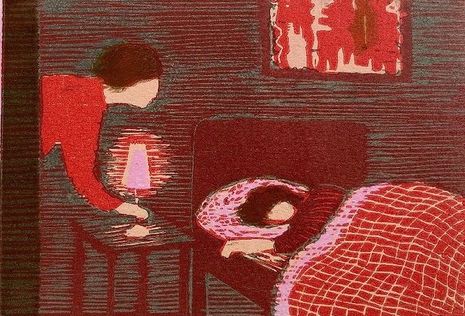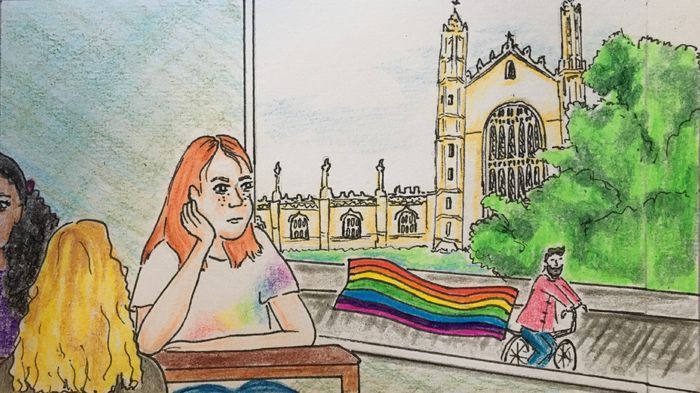Let stars come forth, without one quiet thought
Considering his time so far at university, Deputy Features Editor Alex Levy discusses loneliness in Cambridge and his relationship to societal narratives of romance, encouraging a more nuanced attitude to human connection

There is a notebook in my bedside table, given to me on my 19th birthday. It is blank except for 3 pages of gratitude – abortive attempts at perspective. They were scrawled reticently in moments where I wasn’t feeling terribly unhappy, but lying in bed, contemplating the approaching, solitary minutes where I would have to confront those unvarnished and decidedly nocturnal thoughts which assail us all from time to time. A pre-emptive strikebound in green, with an elastic fastener.
Gratitude is one way I tried to quiet my mind and restore a sense of contentment which I hadn’t felt for a while but is now slowly returning. Contentment: a tricky, diaphanous feeling that once you notice is missing feels as though it never existed in the first place. Much like that intangible, fairy-tale image I had of Cambridge, now beyond reach even in the pink light of the most spellbinding January evenings. In black biro and on neat lines I list the immense privileges life has afforded me:
1. Brilliant and supportive friends 2. Studying in a beautiful place 3. Mine and my family’s health 4. Financial and material stability.
With each pen stroke, I was trying to drum into my head the simple and fundamentally self-indulgent fact that it could be worse. I tried, unsuccessfully, to remedy the superficiality of my anxieties with these rational statements - because frankly I was sometimes embarrassed by my own concern, no matter how profoundly it worried me at times: ‘I feel alone.’
“So began my unrelenting comparison of my experience to the false comfort of what ‘should’ be”
After about a year of university, feeling something was off, I told one of my brilliant friends about this loneliness. Paradoxical, no? But when I really thought about it, I had felt like this before, despite always having been surrounded by love. I came out as gay when I was 18 and that moment of supposed self-realisation didn’t seem to have for me the same effect it had on others. So began the unrelenting comparison of my experience to the false comfort of what ‘should’ be - still, I brushed my discomfort off as I headed to university, excited after years of silence to be open with new people. Although the ability to ease into your identity is a fantastic and privileged experience, still someone, or something, felt missing. I was meeting incredible new friends and having a great time, but had had most of the flurry of traditional young adult experiences before university – romance seemed the last stubborn bastion of youth. And while I didn’t notice and wasn’t enormously bothered at first, the butterflies, sparks and whatever else is supposed to fly simply didn’t. At first, I was sure it was the pandemic, but quite suddenly, one day, the questioning began.
I consider myself a very social person, and am sustained by connection with others. Society fashions romance as the logical counterpart to the satisfying platonic and family relationships which mean that, in spite of my worries, my life has always felt full. I flirt, date, sleep with people and have made some brilliant connections in my ongoing (mis)adventures with romance. But the nagging possibility at my core that maybe this wasn’t for me has been one of the most disconcerting and disorientating experiences of my life (evidence of my enormous luck so far – see notebook of gratitude).
And the thing about romantic love is its inestimable cultural clout, a collective obsession stretching back thousands of years which has inspired or featured in most of humanity’s greatest productions. Even the medieval texts I find myself studying seem alienating, their amorous themes fixing me with a pointed stare from across the centuries. But me? I once felt a strange affinity with the tragic characters of Wedekind’s ‘Spring Awakening’ – confused and exhausted Moritz, leaving his desk to sit at the window and longing to join the spirits he imagines moving among the rustling leaves of the trees.
“I catch myself and wonder why I am trying to reduce lovely, human experiences to arbitrary and hugely subjective categories”
My pretentious ramblings and the veritable fashion runway that is the Sidgwick Site betray the fact that humanities students are so often creatures of aesthetic. It is a ridiculous thought, but I can find little glamorous or aesthetic about the way I feel. There’s a certain cachet to feeling young and lost, but in my (now infrequent) low moments, it feels more like an emptiness, a lack. No dusty volume to be found in the MML library has put into lucid prose the specific unease I feel when I think about my future. Sage authors and teenagers alike have a universal understanding of heartbreak, and at the end of the day, a cigarette by the Cam while thinking about an unrequited love is just infinitely more attractive than my own panicked twilight confusion - for which there seems no eloquent salve, only confidence in the truth that whatever way I am wired, that is, and has to be, me.
Feelings such as mine can of course come under a number of entirely valid and well-documented orientations, and the disappointing lack of acknowledgement of ace awareness week by my JCR is a testament to the long path to societal acceptance which lies ahead for the community of people who identify on the broad spectrums of romantic and sexual attraction. These queer identities must be recognised if we want to mitigate the shame and confusion that so many feel, and the profound marginalisation experienced both within and outside of the LGBTQ+ community. Equally, I know a good number of people who feel alienated by our societal narratives of young love, and a more nuanced attitude towards romance and sex has the potential to ease the pressure and disillusionment which so many feel.
At 20, I don’t know my feelings well enough to find a new label that fits or is helpful, with so many people yet to meet and experiences I am yet to have. The whirlwind of self-critical thoughts has quietened, and the maxim I’ve found most useful is to take relationships in my life simply for what they are – connections between people. I catch myself and wonder why I am trying to reduce lovely, human experiences to arbitrary and hugely subjective categories. I avoid expectation and the normative ideals instilled in us from a young age that romantic relationships are necessarily superior to platonic ones, and to live in the present rather than ruminating on distant and hypothetical futures; in this space, I am happy, more open. Humans really are the most complex of beings and relationships of any kind are the most wonderfully subjective things we do – for this, I am grateful.
Title quote adapted from ’The Prelude’ by William Wordsworth
 News / University Council rescinds University Centre membership20 February 2026
News / University Council rescinds University Centre membership20 February 2026 News / Hundreds of Cambridge academics demand vote on fate of vet course20 February 2026
News / Hundreds of Cambridge academics demand vote on fate of vet course20 February 2026 News / Judge Business School advisor resigns over Epstein and Andrew links18 February 2026
News / Judge Business School advisor resigns over Epstein and Andrew links18 February 2026 News / Union cancels event with Sri Lankan politician after Tamil societies express ‘profound outrage’20 February 2026
News / Union cancels event with Sri Lankan politician after Tamil societies express ‘profound outrage’20 February 2026 News / Caius students fail to pass Pride flag proposal20 February 2026
News / Caius students fail to pass Pride flag proposal20 February 2026










